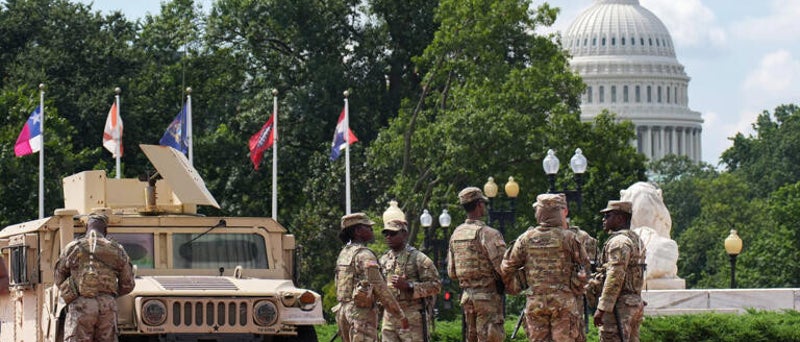By The Beltway Brief | August 24, 2025
In an unprecedented peacetime mobilization, nearly 2,000 National Guard troops are now deployed in Washington, D.C., with Defense Secretary Pete Hegseth authorizing them to carry weapons for "personal protection" amid a federal crime crackdown. Simultaneously, up to 1,700 Guard members are mobilizing across 19 states to support Immigration and Customs Enforcement (ICE) with administrative tasks, including detainee processing and data collection. These parallel operations signal a dramatic expansion of military involvement in domestic affairs, sparking legal and political backlash.
Guard troops in D.C. can now carry M17 pistols following Hegseth’s authorization. Their roles include maintaining a "visible security presence" at monuments, checkpoints, and Metro stations, though their direct involvement in law enforcement seems to remain limited.
Legal experts that have spoken on the matter warn that Title 32 creates a "loophole" to bypass Posse Comitatus (federal law that limits the use of federal military personnel to enforce domestic policies within the United States), potentially enabling presidential overreach. Retired Maj. Gen. Randy Manner questioned the emergency justification, noting the deployment could cost $20 million monthly and strain Guard readiness.
Why does it matter? Taxpayers bear the financial burden, with D.C. operations alone costing an estimated $20 million monthly. Critics argue funds should prioritize local law enforcement and social programs.
These deployments represent a historic shift in domestic military policy, testing constitutional boundaries and federal-state dynamics. While the administration frames them as necessary for public safety and immigration enforcement, critics see politicized maneuvers that could erode civil liberties and militarize civilian spaces. The outcomes will likely influence presidential power precedents for decades.
Stay informed with The Beltway Brief.

MSN August 14th, 2025 (Photo by Kevin Dietsch/Getty Images)